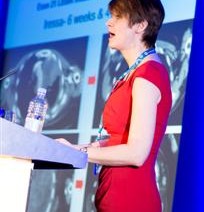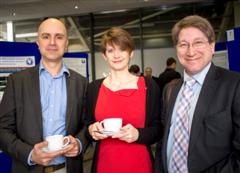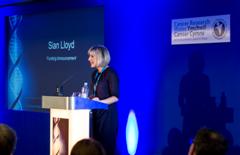Wonderful Day at the Cancer Research Wales Science Symposium
03 Apr 2013
At the start of March, Cancer Research Wales (CRW) held a one-day symposium at the impressive SWALEC stadium in Cardiff, where scientists, clinicians and research nurses from all over Wales gathered to discuss the latest progress in cancer research in Wales. This gave the charity the opportunity to showcase the excellent research that you, the people of Wales, have made possible.
The event which took the theme “Toward Personalised Cancer Treatments” was hosted by Sian Lloyd, Wales’ very own national BBC news presenter (pictured opening the proceedings). The day got off to a flying start with an announcement by Sian, of a new CRW £1.5M grant awarded to the Wales Cancer Bank (WCB). This was followed by an address by the Health Minister, Ms Lesley Griffiths, describing how Welsh Government is committed to cancer care in Wales and how research is central to helping them achieve this. CRW are proud to have consulted and contributed directly to the document “Together Against Cancer”, which was published last year and outlines Welsh Government’s vision and objectives for improving cancer prevention, treatment and care over the next 5 years.
 Professor Malcolm Mason, CRW Professor of Clinical Oncology, Cardiff University, opened the morning round of presentations with an excellent talk that outlined the challenges facing cancer treatment with the large number of new oncology drugs that are continually coming off the pharmaceutical pipeline. Professor Mason informed how the WCB is strategically positioned to impact on how these new drugs are better deployed to patients. He detailed the research that will be made possible as a result of the newly awarded grant and the significance this will have for the health and people of Wales. The closely related talks by Prof Mason and Dr Rachel Butler (pictured), who followed, went on to describe how all people are different and how these differences can be reflected in the genetic and molecular make-up of individual tumours. Properties that have significant influence on how certain people respond to specific treatments. Such personalised approaches to cancer treatment will have ever increasing importance in the current era of targeted medicine, where new cancer drugs are rationally designed against the exact molecular defects identified in tumours.
Professor Malcolm Mason, CRW Professor of Clinical Oncology, Cardiff University, opened the morning round of presentations with an excellent talk that outlined the challenges facing cancer treatment with the large number of new oncology drugs that are continually coming off the pharmaceutical pipeline. Professor Mason informed how the WCB is strategically positioned to impact on how these new drugs are better deployed to patients. He detailed the research that will be made possible as a result of the newly awarded grant and the significance this will have for the health and people of Wales. The closely related talks by Prof Mason and Dr Rachel Butler (pictured), who followed, went on to describe how all people are different and how these differences can be reflected in the genetic and molecular make-up of individual tumours. Properties that have significant influence on how certain people respond to specific treatments. Such personalised approaches to cancer treatment will have ever increasing importance in the current era of targeted medicine, where new cancer drugs are rationally designed against the exact molecular defects identified in tumours.
This new research will seek to characterise (with respect to disease causing genes and proteins) the thousands of individual tumours contained within the WCB. These specimens have been kindly donated by the people of Wales, who have undergone biopsy or surgery as part of their cancer diagnosis or treatment. Many different tumour sites are represented such as cancers of the breast, colon, prostate, ovary, kidney and pancreas. The characterisation will allow investigators to create molecular fingerprints that may provide better clues as to how certain people with certain profiles can be treated more effectively with one or more of the ever increasing number of anti-cancer drugs that are continually being developed, or equally an already existing chemotherapy or radiotherapy regime. In future the ability to match the right drug or combinations of drug to the right patient will ultimately improve overall survival rates and also importantly prevent people from having to undergo unnecessary treatment with an inappropriate therapy. Importantly, these fully characterised sample sets will also provide an invaluable resource for many years to come from which researchers across Wales and beyond can add their own piece to the very complex puzzle that is cancer.
The mid-morning session went onto discuss the role of Human Papillomavirus (HPV) in cancer and it was interesting to see how screening for a common everyday virus may in future actually direct treatment choice for several cancer types. Dr Sam Hibbitts went on to explain the major findings of the HPV baseline project that has sought to establish the frequency and type of HPV infection occurring in women attending their first cervical smear in Wales. HPV is the major cause of cervical cancer in women and has a result has been the focus of a government led vaccination programme in schoolgirls. Dr Hibbitts explained that the prevalence of certain HPV types (of which there are over 100 but only 14 are considered high risk for cancer) will impact on the success of the vaccination programme in Wales and the baseline project will serve as a critical comparison group against which this success can be measured. This research will also help identify the possible emergence of replacement HPV types that are also considered high risk and which the current vaccines do not offer protection against. A finding if realised will influence the design of second-generation HPV vaccines.
Dr Mererid Evans a consultant oncologist at Velindre Cancer Centre, gave an excellent and very informative talk of the research that she has been undertaking in collaboration with Dr Ned Powell of the HPV research group, looking at the impact of HPV in some types of Head and Neck (H&N) cancers. Dr Evans presented data showing that the incidence of H&N cancer caused by HPV has actually trebled in Wales over the last 20 years, with males most affected by these increases. Interestingly, it was found that H&N cancers caused by HPV were very responsive to treatments such as surgery, chemo and radiotherapy as compared to tumours that were negative for HPV. These results suggest that in future patients whose tumours are found to harbour HPV may be offered less aggressive treatment in order to achieve a cure, thus reducing side effects which can include alterations to taste and difficulty in swallowing.
After a much needed and delightful lunch the momentum of the day continued as Dr Andrew Godkin, consultant gastroenterologist based at the Cardiff School of Medicine (Heath Hospital) kicked off the afternoon session with a great overview of immunotherapy. This is a form of treatment where clinicians seek to harness the power of a patient’s own immune system to help eradicate or control the cancer. Immunotherapy is often considered the most personalised form of cancer treatment. In his talk, Dr Godkin presented the first preliminary, yet very promising results acquired from a CRW sponsored immunotherapy trial he is currently conducting in patients with inoperable advanced colon cancer. The trial seeks to carefully manipulate the patient’s own immune system. This is being achieved through the use of very low doses of chemotherapy in order to boost the body’s response to a cancer vaccine designed against molecules that are only expressed on colon cancer cells. We very much look forward to seeing the full results from the trial in due course.
We were then treated to a series of enterprising talks that described some of the great advancements taking place in radiotherapy research. How this research is enabling more personalised approaches to be adopted within the field of radiotherapy, a treatment modality long considered standard and empirical in nature was discussed. The use of complex physics, computer science coupled with advanced medical imaging technologies are allowing the more accurate targeting of tumours with larger doses of radiation. This sets out to achieve a greater tumour kill whilst at the same time sparing normal surrounding tissue, thus reducing unwanted side effects. Examples of these improved technologies in action were given for cancers of the Head and Neck (Dr Emiliano Spezi) and prostate cancer (Dr John Staffurth).
A long-term commitment of CRW has been the discovery and development of the next generation of cancer researchers for Wales, an objective achieved through the continued funding of PhD studentships over the years. Indeed it is through the generosity of the Welsh public that CRW is able to currently fund 24 PhD projects that are on-going across the principality. Therefore, it was very fitting that the afternoon was concluded with prizes made to 3 students for the excellent poster presentations they gave of their research during the day. A total of 18 students came from across Wales to present their work and who helped make the day special. The standard of the posters was exceptional, making the task of singling out particular projects for an award, very difficult for the judges. This symposium gave some students their very first opportunity to attend and present at a scientific meeting. This will hopefully have provided them with valuable experience for when they go and fly the flag for Wales at the larger international conferences that they will surely attend later on in their studies.
The first award was made to Miss Jana Jezkova, from Bangor University, who described the role of a molecule called Brachyury in colon cancer. This molecule is shown to impact on the generation of cancer stem cells in colon cancer, cell types which are proposed to lead to resistance against chemo and radiotherapy. Trying to target these cancer stem cells as a novel therapy for advanced colon cancer is very much a main focus of Dr Jane Wakeman’s laboratory at Bangor. The second award was made to Beatrice Berthon for her work examining the role of PET in radiotherapy planning for Head and Neck cancer. Finally, Ridwana Chowdhury who is based at the CRW laboratories at Velindre Cancer Centre picked up a poster prize for her studies describing the role of exosomes in the development of advanced and aggressive prostate cancer and how these may be targeted as a new therapy.
 At the end of a fantastic day it was rewarding to hear many of the leading scientists comment how much they had enjoyed the day and how great it was to have the opportunity to catch up with colleagues they had not seen for a while. We also hope that the symposium provided a forum in which new friendships were made, ideas shared and new collaborations forged. Below are just some of the comments from those who attended:
At the end of a fantastic day it was rewarding to hear many of the leading scientists comment how much they had enjoyed the day and how great it was to have the opportunity to catch up with colleagues they had not seen for a while. We also hope that the symposium provided a forum in which new friendships were made, ideas shared and new collaborations forged. Below are just some of the comments from those who attended:
“I had an enjoyable day and it was fun catching up with everyone. Thank you and the team at CRW for organising the symposium”
“Well done for yesterday – it was a great success and ran really well and great venue”
“I was thrilled to see the incredible strides the Charity has made”
“Thanks to everyone who made the day such a success”
“I thought it was a really good day – well organised and good content”
“The day was really well organised. Hope it will be a regular event”

